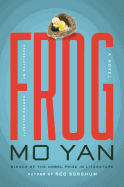
Mo Yan's Frog is as alien and upsetting as good science fiction. His first novel since winning the 2012 Nobel Prize in Literature opens in 1960, in a village where all newborn children are named after body parts. A classroom of 35 starving students discover that they can eat coal to survive. The novel becomes truly surreal when it gets to China's disturbing, viciously enforced one-child policy.
Narrator Wan Zu ("Foot"), nicknamed Tadpole, is gathering material about his indomitable aunt Gugu, who was the first professional midwife in Northeast Gaomi Township, the locale of many Mo Yan novels. Gugu is the best there is; she's also the aggressive enforcer of the Party's one-child policy and is responsible for more than 2,000 involuntary abortions. She stands at the center of the novel, and carries it largely unsympathetically. When Tadpole's lovely wife refuses to abort her second pregnancy, Gugu swears to uphold the Party policy. That Mo Yan (POW!) manages to make her ultimately self-aware and forgivable is a measure of his constant compassion toward mistake-makers.
Frog is a big, challenging novel with a dizzying number of characters with similar names, but the narrative thrills far outweigh the confusion. The final section of the book is the script of the play that Tadpole has been trying to write throughout the story, in which Gugu finally confronts her own guilt for following Party directives, a theatrical conclusion to Mo Yan's portrait of a brilliant doctor who makes some horrible politically driven choices while dedicating her life to her community. --Nick DiMartino, Nick's Picks, University Book Store, Seattle, Wash.

